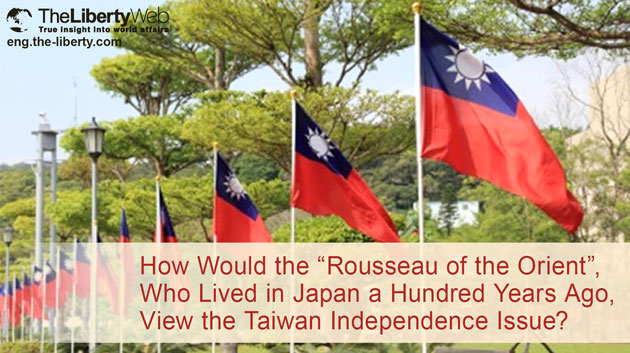How Would the “Rousseau of the Orient”, Who Lived in Japan a Hundred Years Ago, View the Taiwan Independence Issue?
In the presidential election held in January, Taiwan elected Tsai Ing-wen, chair of the pro-independence Democratic Progressive Party (DPP), as its first female president. The eyes of the world are now on the birth of this new leader.
Tsai called for the need to depart from the incumbent president Ma Ying-jeou’s pro-Chinese policy and to maintain a certain distance from China. Her victory lies in the fact that her realistic stance won the hearts and minds of the Taiwanese voters.
Taiwan has been facing the alternative of cozying up to China or defending Taiwan’s independence at any cost. While Taiwan wants to benefit from China’s economic growth, it does not want to be swallowed up by China-Taiwan is confronting this dilemma because it is a small nation. How should Taiwan resolve this security dilemma?
To help solve Taiwan’s problem, let us introduce a book that was published in Japan a hundred years ago. A Japanese thinker, who was later called the “Rousseau of the Orient”, wrote this book.
The Gentleman Advocates Ethical Diplomacy Based on Pacifism
The author of the book is Chomin Nakae, who was a theoretical pillar of the Freedom and People’s Rights Movement during the Japanese Meiji Era. In 1887, Nakae wrote A Discourse of Three Drunkards on Government, the content of which suggests Taiwan’s dilemma.
The book depicts three fictitious characters drinking sake and discussing how national governance should be during Japan’s Meiji era. It describes how Master Nankai, who is referred to as a sage, teaches the art of politics and diplomacy to his two disciples, the Gentleman of Western Learning and the Champion of the East.
First, the Gentleman, who embraces Western democratic values, advocates disarmament by abolishing military forces. He insists that the country develop foreign policy based on morals. In terms of an aggression of a hostile country, he decisively says as follows:
Suppose our opponents launch an armed invasion and occupy our country. The land will have to be shared. They exist and we exist; they stay and we stay. What kind of conflict could there be? …. Truly our opponents lack civility, while we possess it. He is against reason; we stand for reason.
There are few disarmers in today’s Taiwan, but if the Gentleman’s opinion is applied to Taiwan’s current situation, it represents the idea of those with the pro-China stance, “As long as Taiwan maintains a friendly relationship with China, it will be safe from the China’s invasion.”
The Champion Stands for Military Advancement to Other Countries
Unlike the Gentleman, the Champion stresses the need to possess military forces, and supports policies to increase wealth and military power. He maintains that Japan should advance into China to compete with Western powers. He ridicules the Gentleman’s idea, saying as follows:
In the first place, war is an inevitable force in the actual world, no matter how much you condemn it using scholarly theory. Besides, it is a natural characteristic of an animal to like to win and hate to lose…. A civilized nation is strong without exception.
He insists that Japan send troops to the foreign country and enhance its national power so that the West does not outdo the country. The Champion’s ideas are close to what Taiwan’s pro-independence forces really think.
Master Nankai Insists on a Defense Strategy
After listening to both sides of the story, Master Nankai expresses his own opinion. He does not agree with either side.
Master Nankai replied, ‘Mr. Gentleman’s ideas derive from theoretical musings, both spoken and written, brewed in the minds of European scholars, but these opinions have not yet been practiced in the world. They are like dazzlingly attractive clouds. Mr. Champion’s ideas, on the other hand, are what ancient leaders actually put into practice once in a hundred or thousand years. Through them, these leaders achieved their fame. But such ideas are no longer practicable, and they have become mere tricks of political jugglers.
He means that the Gentleman’s ideas are nothing but idealism, while the Champion’s are outdated.
Then, Master Nankai talks about the diplomatic course that Japan should take, saying as follows:
Japan should develop peaceful and friendly relations with every country around the world. Even under unavoidable circumstances, Japan must stick to a defense strategy and avoid the burden and the cost of sending its troops to distant countries and try hard to take a load off the shoulder of the public.
He goes on to say, “If a hostile country tries to invade our country, we fight with all our might. All the people should become soldiers to fight to defend strongholds or to make a sudden surprise attack on the enemy.” He suggests an idea that approves of something like guerilla tactics.
How Should Taiwan Solve Its Dilemma?
It is hard to say which of these three ideas is Chomin’s true thought. If Master Nankai’s opinion reflects what Chomin really thinks, his argument is that Taiwan should run the country in a way that does not deteriorate its relationship with China while at the same time strengthening the nation’s defense. President Tsai’s opinion is somewhat similar to this.
Following the outcome of Taiwan’s presidential election, Master Ryuho Okawa, the founder and CEO of Happy Science, summoned the guardian spirit of Ms. Tsai Ing-wen on February 7th to hear her thoughts. In the interview, Tsai offered some suggestions on how Taiwan should resolve the dilemma that faces the country. Her spiritual message will be available in books and hit the shelves of bookstores around Japan.
Considering the Japanese sea lanes that stretch off the coast of Taiwan, Japan should not regard the Taiwan independence issue as a fire on the other side of the river. It is necessary to watch closely every move that President Tsai takes.



















